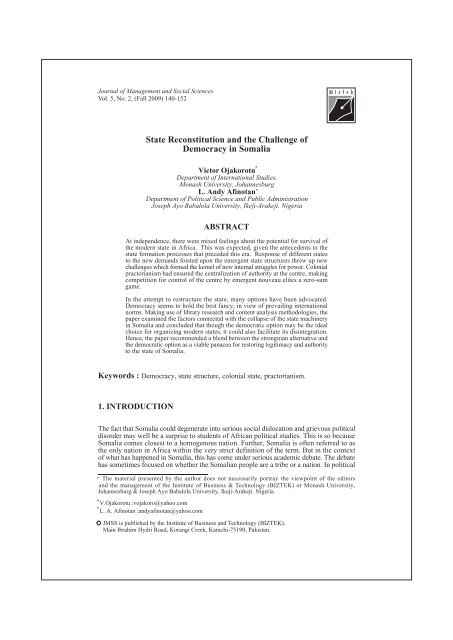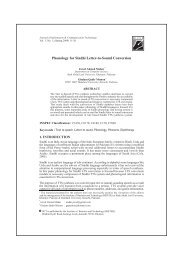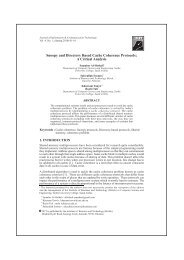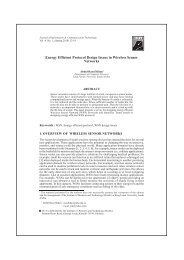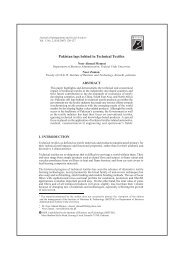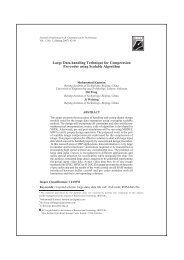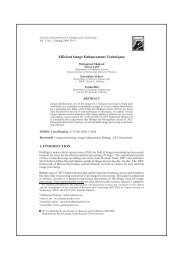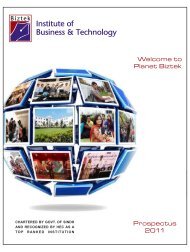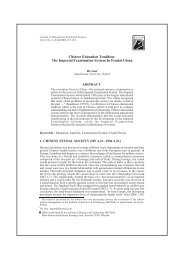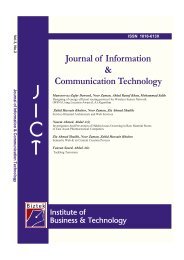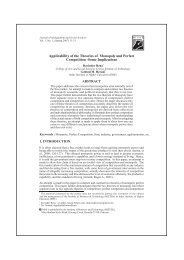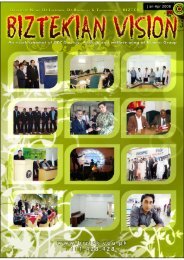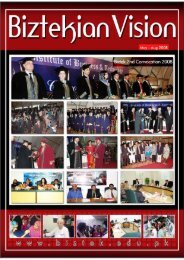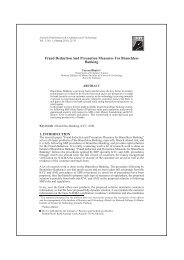State Reconstitution and the Challenge of Democracy in Somalia
State Reconstitution and the Challenge of Democracy in Somalia
State Reconstitution and the Challenge of Democracy in Somalia
You also want an ePaper? Increase the reach of your titles
YUMPU automatically turns print PDFs into web optimized ePapers that Google loves.
Journal <strong>of</strong> Management <strong>and</strong> Social Sciences<br />
Vol. 5, No. 2, (Fall 2009) 140-152<br />
<strong>State</strong> <strong>Reconstitution</strong> <strong>and</strong> <strong>the</strong> <strong>Challenge</strong> <strong>of</strong><br />
<strong>Democracy</strong> <strong>in</strong> <strong>Somalia</strong><br />
Victor Ojakorotu<br />
Department <strong>of</strong> International Studies,<br />
Monash University, Johannesburg<br />
L. Andy Af<strong>in</strong>otan*<br />
Department <strong>of</strong> Political Science <strong>and</strong> Public Adm<strong>in</strong>istration<br />
Joseph Ayo Babalola University, Ikeji-Arakeji. Nigeria<br />
ABSTRACT<br />
At <strong>in</strong>dependence, <strong>the</strong>re were mixed feel<strong>in</strong>gs about <strong>the</strong> potential for survival <strong>of</strong><br />
<strong>the</strong> modern state <strong>in</strong> Africa. This was expected, given <strong>the</strong> antecedents to <strong>the</strong><br />
state formation processes that preceded this era. Response <strong>of</strong> different states<br />
to <strong>the</strong> new dem<strong>and</strong>s foisted upon <strong>the</strong> emergent state structures threw up new<br />
challenges which formed <strong>the</strong> kernel <strong>of</strong> new <strong>in</strong>ternal struggles for power. Colonial<br />
practorianism had ensured <strong>the</strong> centralization <strong>of</strong> authority at <strong>the</strong> centre, mak<strong>in</strong>g<br />
competition for control <strong>of</strong> <strong>the</strong> centre by emergent nouveau elites a zero-sum<br />
game.<br />
In <strong>the</strong> attempt to restructure <strong>the</strong> state, many options have been advocated.<br />
<strong>Democracy</strong> seems to hold <strong>the</strong> best fancy, <strong>in</strong> view <strong>of</strong> prevail<strong>in</strong>g <strong>in</strong>ternational<br />
norms. Mak<strong>in</strong>g use <strong>of</strong> library research <strong>and</strong> content analysis methodologies, <strong>the</strong><br />
paper exam<strong>in</strong>ed <strong>the</strong> factors connected with <strong>the</strong> collapse <strong>of</strong> <strong>the</strong> state mach<strong>in</strong>ery<br />
<strong>in</strong> <strong>Somalia</strong> <strong>and</strong> concluded that though <strong>the</strong> democratic option may be <strong>the</strong> ideal<br />
choice for organiz<strong>in</strong>g modern states, it could also facilitate its dis<strong>in</strong>tegration.<br />
Hence, <strong>the</strong> paper recommended a blend between <strong>the</strong> strongman alternative <strong>and</strong><br />
<strong>the</strong> democratic option as a viable panacea for restor<strong>in</strong>g legitimacy <strong>and</strong> authority<br />
to <strong>the</strong> state <strong>of</strong> <strong>Somalia</strong>.<br />
*<br />
Keywords : <strong>Democracy</strong>, state structure, colonial state, practorianism.<br />
1. INTRODUCTION<br />
The fact that <strong>Somalia</strong> could degenerate <strong>in</strong>to serious social dislocation <strong>and</strong> grievous political<br />
disorder may well be a surprise to students <strong>of</strong> African political studies. This is so because<br />
<strong>Somalia</strong> comes closest to a homogenous nation. Fur<strong>the</strong>r, <strong>Somalia</strong> is <strong>of</strong>ten referred to as<br />
<strong>the</strong> only nation <strong>in</strong> Africa with<strong>in</strong> <strong>the</strong> very strict def<strong>in</strong>ition <strong>of</strong> <strong>the</strong> term. But <strong>in</strong> <strong>the</strong> context<br />
<strong>of</strong> what has happened <strong>in</strong> <strong>Somalia</strong>, this has come under serious academic debate. The debate<br />
has sometimes focused on whe<strong>the</strong>r <strong>the</strong> <strong>Somalia</strong>n people are a tribe or a nation. In political<br />
* The material presented by <strong>the</strong> author does not necessarily portray <strong>the</strong> viewpo<strong>in</strong>t <strong>of</strong> <strong>the</strong> editors<br />
<strong>and</strong> <strong>the</strong> management <strong>of</strong> <strong>the</strong> Institute <strong>of</strong> Bus<strong>in</strong>ess & Technology (BIZTEK) or Monash University,<br />
Johannesburg & Joseph Ayo Babalola University, Ikeji-Arakeji. Nigeria.<br />
* V.Ojakorotu :vojakoro@yahoo.com<br />
*<br />
L. A. Af<strong>in</strong>otan :<strong>and</strong>yaf<strong>in</strong>otan@yahoo.com<br />
C<br />
JMSS is published by <strong>the</strong> Institute <strong>of</strong> Bus<strong>in</strong>ess <strong>and</strong> Technology (BIZTEK).<br />
Ma<strong>in</strong> Ibrahim Hydri Road, Korangi Creek, Karachi-75190, Pakistan.
<strong>State</strong> <strong>Reconstitution</strong> <strong>and</strong> <strong>the</strong> <strong>Challenge</strong> <strong>of</strong> <strong>Democracy</strong> <strong>in</strong> <strong>Somalia</strong><br />
rhetoric <strong>the</strong> first is currently a term <strong>of</strong> abuse <strong>and</strong> <strong>the</strong> second <strong>of</strong> approbation (Lewis, 1998).<br />
While <strong>in</strong> o<strong>the</strong>r African states, <strong>the</strong> hydra-headed problem <strong>of</strong> ethnicity could be deciphered<br />
<strong>in</strong> most national <strong>and</strong> domestic problems. In <strong>Somalia</strong>, <strong>the</strong> society was structured traditionally<br />
as clan system. Therefore Clanism has always been a central pillar <strong>of</strong> <strong>the</strong> Somali traditional<br />
political life.<br />
Thus as Lewis has already stated<br />
“...Clanism is <strong>the</strong> Somali version <strong>of</strong> <strong>the</strong> generic problem <strong>of</strong> ethnicity or tribalism,<br />
social scientists with<strong>in</strong> Somali studies have long focused on an analysis or tribalism...”<br />
(Lewis, 1990)<br />
The above equally throws-up salient questions. For <strong>in</strong>stance, <strong>Somalia</strong> has over <strong>the</strong> years<br />
developed a strong sense <strong>of</strong> community life exemplified by a common language, a broadly<br />
homogeneous <strong>and</strong> largely pastoral culture <strong>and</strong> a thorough adherence to <strong>the</strong> tenets <strong>of</strong> Islam.<br />
Then why this condition <strong>of</strong> anarchy <strong>in</strong> which <strong>the</strong> state has found itself <strong>and</strong> from which it<br />
is still reel<strong>in</strong>g The social science literature is awash with all k<strong>in</strong>ds <strong>of</strong> propositions. The<br />
central concept or element which has become typical <strong>in</strong> highlight<strong>in</strong>g <strong>the</strong> <strong>Somalia</strong>n political<br />
system all through this literature is <strong>the</strong> importance <strong>of</strong> k<strong>in</strong>ship. Lewis argues that segmented<br />
clan system rema<strong>in</strong>s <strong>the</strong> bedrock or foundation, <strong>and</strong> 'clannishness' which he described as<br />
<strong>the</strong> primacy <strong>of</strong> clan <strong>in</strong>terest <strong>the</strong>n has <strong>the</strong> tendency <strong>of</strong> divid<strong>in</strong>g <strong>the</strong> society <strong>and</strong> creat<strong>in</strong>g a<br />
segmented social structure which <strong>in</strong> turn is a recipe for "<strong>in</strong>stitutionalized <strong>in</strong>stability"<br />
(Lewis,1961). In similar ve<strong>in</strong>, Samatar argues that <strong>the</strong> changes fostered on <strong>Somalia</strong>n<br />
traditional lifestyle like <strong>the</strong> partial commoditization <strong>of</strong> production <strong>and</strong> <strong>the</strong> confusion <strong>of</strong><br />
k<strong>in</strong>ship with clannishness have both done enough damage to <strong>Somalia</strong>'s existence as a<br />
nation (Samatar, 1988.) The transformation <strong>of</strong> social roles h<strong>and</strong>ed to <strong>the</strong> nor<strong>the</strong>rn Somalis<br />
which sought to alienate <strong>the</strong>m from <strong>the</strong>ir traditional role <strong>and</strong> which was exploited by<br />
lead<strong>in</strong>g politicians as well as <strong>the</strong> <strong>in</strong>telligentsia also played a part. (Samatar, 1989)<br />
The policies <strong>of</strong> Siad Barre <strong>in</strong> <strong>the</strong> nor<strong>the</strong>rn part <strong>of</strong> <strong>Somalia</strong> especially with <strong>the</strong> Isaaq clan<br />
where from 1978-1980 onwards, he <strong>in</strong>stigated widespread violence designed to punish <strong>the</strong><br />
people <strong>of</strong> this region have been well documented . As a result <strong>of</strong> this oppressive rule, <strong>the</strong><br />
people <strong>of</strong> this region mobilized <strong>in</strong>to groups. Before long violent revolts had engulfed <strong>the</strong><br />
north <strong>and</strong> subsequently spread down. By January 1991, Siad Barre had fled Mogadishu<br />
(Battera, 2004).<br />
Events after his departure had assumed such a horrible proportion. <strong>Somalia</strong> had experienced<br />
several peacekeep<strong>in</strong>g operations all supported by <strong>in</strong>ternational bodies. Notable among<br />
<strong>the</strong>se was <strong>the</strong> United Nation <strong>in</strong>tervention force nicknamed 'Operation Restore Hope' which<br />
was ma<strong>in</strong>ly an American peacekeep<strong>in</strong>g operation. The ironical angle to <strong>the</strong>se peacekeep<strong>in</strong>g<br />
operations is that all have ended <strong>in</strong> serious failures. Besides this, <strong>the</strong>y have all left <strong>Somalia</strong><br />
<strong>in</strong> an even more sorry state than before. It should be understood that <strong>Somalia</strong> because <strong>of</strong><br />
its traditional <strong>and</strong> cultural style is close to what could be described as a decentralized<br />
political set up. Its heavy reliance on clan <strong>and</strong> Clanism which organizes its agro-pastoral<br />
life <strong>and</strong> which provides <strong>the</strong> l<strong>in</strong>e <strong>of</strong> conflicts along which struggles for recognition have<br />
been fought is a testimony to this fact (Battera, 2004). In <strong>the</strong> same ve<strong>in</strong>, Lewis argues that<br />
<strong>the</strong> Somalis had lived under decentralized clan based politics which is <strong>of</strong>ten referred to<br />
as 'pastoral democracy'. Deriv<strong>in</strong>g from this is <strong>the</strong> relative peaceful co-existence fostered<br />
by decentralized governance. Therefore, it is important to identify two major livewires <strong>of</strong><br />
social existence which had tended to characterize <strong>Somalia</strong>. First is a h<strong>in</strong>terl<strong>and</strong> pastoral<br />
<strong>and</strong> agro-pastoral movement; second is <strong>the</strong> establishment <strong>of</strong> many coastal states which<br />
developed central adm<strong>in</strong>istrative <strong>and</strong> legal systems based strictly on Islamic law (Battera,<br />
2004).<br />
However, it must be noted that after <strong>the</strong> British Somali-l<strong>and</strong> <strong>and</strong> Italian <strong>Somalia</strong> were<br />
amalgamated <strong>in</strong> July 1 1960. The former came to <strong>in</strong>troduce what it called participatory<br />
democracy (<strong>the</strong> latter had completely lost out s<strong>in</strong>ce <strong>the</strong> outcome <strong>of</strong> its ventures <strong>in</strong> <strong>the</strong><br />
Vol. 5, No. 2, (Fall 2009)<br />
141
Victor Ojakorotu, L. Andy Af<strong>in</strong>otan<br />
Second World War was not favorable. By this, it had hope that all Somalis would be<br />
allowed to exercise <strong>the</strong>ir franchise <strong>in</strong> popular electoral processes. To this end, <strong>the</strong> British<br />
government had <strong>in</strong>troduced multiparty politics. As one could learn from Somali history,<br />
this enterprise was <strong>in</strong>deed <strong>the</strong> spanner needed to undo <strong>the</strong> nut <strong>of</strong> unity that had been <strong>the</strong><br />
hallmark <strong>of</strong> <strong>the</strong> lives <strong>of</strong> <strong>the</strong> Somali people. Intrigue, dangerous cross carpet<strong>in</strong>g, high level<br />
<strong>of</strong> corruption with<strong>in</strong> <strong>the</strong> rank <strong>and</strong> file <strong>of</strong> politicians, <strong>the</strong> serious tribalism built <strong>in</strong>to party<br />
politics all comb<strong>in</strong>ed to give a warn<strong>in</strong>g signal. An attempt to change <strong>the</strong> government<br />
actually took place but failed until 1966 when army <strong>of</strong>ficer Siyaad Barre led a successful<br />
coup that overthrew <strong>Somalia</strong>'s postcolonial parliamentary democracy <strong>and</strong> established <strong>the</strong><br />
Siyaad led Supreme Revolutionary Council as <strong>the</strong> rul<strong>in</strong>g body (Besteman, 1996). The<br />
policies <strong>of</strong> Siyaad Barre, as earlier noted gave rise to a systematic breakdown <strong>of</strong> order<br />
ultimately lead<strong>in</strong>g to anarchy.<br />
It is aga<strong>in</strong>st this background that this paper seeks to exam<strong>in</strong>e <strong>in</strong> an analytical perspective<br />
<strong>the</strong> real issues <strong>in</strong>volved <strong>in</strong> <strong>the</strong> <strong>Somalia</strong>n imbroglio, with a view to address<strong>in</strong>g <strong>the</strong> follow<strong>in</strong>g<br />
fundamental posers: What are <strong>the</strong> basic contradictions with<strong>in</strong> <strong>the</strong> <strong>Somalia</strong>n body-politic<br />
that seem to make conflict <strong>and</strong> <strong>in</strong>ternec<strong>in</strong>e violence <strong>in</strong>evitable <strong>in</strong> a mono-ethnic post<br />
colonial state Why has democracy <strong>and</strong> its socio-political imperatives which has been so<br />
successful as a worldwide political credo seem to fail so pa<strong>the</strong>tically <strong>in</strong> <strong>Somalia</strong> What<br />
are <strong>the</strong> real challenges to reconciliation, state reconstitution <strong>and</strong> democratic consolidation<br />
<strong>in</strong> <strong>Somalia</strong> What are <strong>the</strong> probable options available to <strong>the</strong> people <strong>in</strong> <strong>the</strong> current<br />
circumstances It must however be stated here that whereas this paper does not <strong>in</strong> any<br />
way, lay claim to <strong>the</strong> capacity to provide all <strong>the</strong> answers, it would never<strong>the</strong>less constitute<br />
a modest contribution to <strong>the</strong> available literature dedicated to f<strong>in</strong>d<strong>in</strong>g dependable solutions<br />
to <strong>the</strong> <strong>Somalia</strong>n question.<br />
2. CONCEPTUAL FRAMEWORK FOR ANALYSIS<br />
Aga<strong>in</strong>st <strong>the</strong> background <strong>of</strong> <strong>the</strong> fact <strong>of</strong> a complete breakdown <strong>of</strong> law <strong>and</strong> order <strong>in</strong> <strong>Somalia</strong>,<br />
<strong>and</strong> <strong>the</strong> subsequent descent <strong>in</strong>to anarchy <strong>in</strong> a social Darw<strong>in</strong>ist perspective, our preferred<br />
conceptual framework for analysis <strong>of</strong> this problematic is <strong>the</strong> <strong>the</strong>ory <strong>of</strong> <strong>in</strong>ternational social<br />
Darw<strong>in</strong>ism. This paradigm depicts nations <strong>of</strong> <strong>the</strong> <strong>in</strong>ternational system as be<strong>in</strong>g <strong>in</strong> a constant<br />
state <strong>of</strong> evolution <strong>and</strong> development through competition <strong>and</strong> anarchy <strong>in</strong> a Hobbessian<br />
perspective, result<strong>in</strong>g <strong>in</strong> <strong>the</strong> survival <strong>of</strong> <strong>the</strong> fittest <strong>and</strong> <strong>the</strong> elim<strong>in</strong>ation <strong>of</strong> <strong>the</strong> weak.<br />
In <strong>the</strong> arena <strong>of</strong> combat between whole peoples <strong>in</strong> which <strong>the</strong> dest<strong>in</strong>y <strong>of</strong> humanity is<br />
determ<strong>in</strong>ed, <strong>the</strong> role <strong>of</strong> war is to pass <strong>the</strong> re<strong>in</strong>s <strong>of</strong> power from <strong>the</strong> weak <strong>and</strong> decay<strong>in</strong>g to<br />
<strong>the</strong> strong <strong>and</strong> dynamic (Rosen & Jones, 1980). This philosophy has come to be associated<br />
with fascism, a doctr<strong>in</strong>e which does not believe ei<strong>the</strong>r <strong>in</strong> <strong>the</strong> possibility or <strong>in</strong> <strong>the</strong> utility<br />
<strong>of</strong> universal peace, equat<strong>in</strong>g pacificism with cowardice. Advanc<strong>in</strong>g war as a positive aspect<br />
<strong>of</strong> fascism, Bernito Musol<strong>in</strong>i asserted that;<br />
"…war alone br<strong>in</strong>gs all human energies to <strong>the</strong>ir highest tension <strong>and</strong> sets a seal <strong>of</strong><br />
ability on <strong>the</strong> peoples who have <strong>the</strong> virtue to face it…" (Musol<strong>in</strong>i <strong>in</strong> Christensen et<br />
al, Quoted <strong>in</strong> ibid)<br />
Nazism, a state philosophy under Adolf Hitler <strong>and</strong> a virulent <strong>and</strong> advanced form <strong>of</strong> fascism<br />
also believes <strong>in</strong> <strong>the</strong> social Darw<strong>in</strong>ist approach to Politics. Accord<strong>in</strong>g to Adolf Hitler <strong>in</strong> his<br />
famous work Me<strong>in</strong> Kampf;<br />
"... Nature knows no political boundaries. First she puts liv<strong>in</strong>g creatures on this globe<br />
<strong>and</strong> watches <strong>the</strong> free play <strong>of</strong> forces. She <strong>the</strong>n confers <strong>the</strong> master's right on her favorite<br />
child, <strong>the</strong> strongest…" (Hitler, 1943; 134-157;Quoted <strong>in</strong> op.cit)<br />
In <strong>the</strong> th<strong>in</strong>k<strong>in</strong>g <strong>of</strong> <strong>the</strong> social Darw<strong>in</strong>ists it amounts to an abdication <strong>of</strong> duty border<strong>in</strong>g on<br />
irresponsibility, not to fight wars <strong>of</strong> territorial expansion <strong>and</strong> acquisition, s<strong>in</strong>ce this lapse<br />
will immediately result <strong>in</strong> a scenario where mastery <strong>of</strong> <strong>the</strong> world will be left to <strong>the</strong> weak<br />
142 Journal <strong>of</strong> Management <strong>and</strong> Social Sciences
<strong>State</strong> <strong>Reconstitution</strong> <strong>and</strong> <strong>the</strong> <strong>Challenge</strong> <strong>of</strong> <strong>Democracy</strong> <strong>in</strong> <strong>Somalia</strong><br />
<strong>and</strong> culturally <strong>in</strong>ferior. The philosophy <strong>of</strong> social Darw<strong>in</strong>ism thus glorifies conflict <strong>and</strong><br />
extols <strong>the</strong> virtues <strong>of</strong> war, giv<strong>in</strong>g as it does a raison d'etre for imperialism <strong>and</strong> war monger<strong>in</strong>g<br />
between states <strong>and</strong> among peoples. This philosophy was a major cause <strong>of</strong> war <strong>in</strong> <strong>the</strong><br />
<strong>in</strong>ternational system <strong>and</strong> particularly <strong>the</strong> Second World War. Although fascist <strong>and</strong> Nazi<br />
movements are now nearly dead, <strong>the</strong> philosophy <strong>of</strong> <strong>in</strong>ternational social Darw<strong>in</strong>ism is not<br />
only alive <strong>and</strong> well (op.cit), it is once aga<strong>in</strong> actually play<strong>in</strong>g itself out - this time <strong>in</strong> <strong>Somalia</strong>.<br />
This paradigm is <strong>of</strong> course very apposite to <strong>the</strong> <strong>Somalia</strong>n situation where <strong>the</strong> unend<strong>in</strong>g<br />
<strong>and</strong> bloody battles between <strong>the</strong> Clans is a struggle for control <strong>of</strong> state power by rival Clans<br />
or group <strong>of</strong> Clans, determ<strong>in</strong>ed to wrest control <strong>of</strong> state apparatus through military superiority,<br />
<strong>in</strong> <strong>the</strong> process <strong>of</strong> state reconstruction <strong>and</strong> nation build<strong>in</strong>g. The rise <strong>of</strong> Warlordism <strong>and</strong> <strong>the</strong><br />
use <strong>of</strong> religion <strong>and</strong> ideology by rival clans to secure <strong>the</strong> help <strong>of</strong> foreign allies most eloquently<br />
testify to this fact. What is even more <strong>in</strong>dicative <strong>of</strong> this is <strong>the</strong> apparent unwill<strong>in</strong>gness <strong>of</strong><br />
<strong>the</strong> rival gladiators to accept an <strong>in</strong>ternational peacekeep<strong>in</strong>g mission to broker a democratic<br />
alternative even after several years <strong>of</strong> violence <strong>and</strong> bloodlett<strong>in</strong>g. Viewed from this perspective<br />
<strong>the</strong> social Darw<strong>in</strong>ist <strong>in</strong>st<strong>in</strong>ct beh<strong>in</strong>d this struggle is unmistakably displayed <strong>in</strong> bold relief.<br />
3. THE SOMALIAN PEOPLE AND TRADITIONAL DIVISIONS<br />
<strong>Somalia</strong> represents what could rightly be called a nation, <strong>and</strong> is, as a socio-political entity<br />
quite unique by comparison to o<strong>the</strong>r African states <strong>in</strong> terms <strong>of</strong> structure <strong>and</strong> composition.<br />
It is however pert<strong>in</strong>ent to consider how this concept <strong>of</strong> a nation with its imperatives <strong>of</strong><br />
historical <strong>and</strong> cultural homogeneity presented itself <strong>in</strong> <strong>Somalia</strong> aga<strong>in</strong>st <strong>the</strong> background <strong>of</strong><br />
<strong>the</strong> development <strong>in</strong> o<strong>the</strong>r part <strong>of</strong> Africa <strong>in</strong> <strong>the</strong> immediate post <strong>in</strong>dependence era .There is<br />
no doubt that many African states experienced near-collapse dur<strong>in</strong>g this period ow<strong>in</strong>g to<br />
factors that could be l<strong>in</strong>ked to tribalism .This phenomenon (tribalism)was however not<br />
expected to be a feature <strong>of</strong> political life <strong>in</strong> <strong>Somalia</strong>, <strong>in</strong> view <strong>of</strong> <strong>the</strong> socio-cultural homogeneity<br />
<strong>of</strong> that country. But Somali politicians <strong>of</strong> <strong>the</strong> post <strong>in</strong>dependence era attested to <strong>the</strong> fact<br />
that <strong>the</strong> major divisive force beh<strong>in</strong>d <strong>the</strong> collapse <strong>of</strong> <strong>the</strong> <strong>Somalia</strong>'s first republic was actually<br />
tribalism. Tribalism worked quite differently <strong>in</strong> <strong>Somalia</strong> by comparison to <strong>the</strong> situation<br />
<strong>in</strong> most African states, but <strong>the</strong> effect on national politics rema<strong>in</strong>ed <strong>the</strong> same. Expla<strong>in</strong><strong>in</strong>g<br />
this peculiar situation, Lewis (1972) posits;<br />
... It is thus clanship <strong>in</strong> <strong>the</strong> technical sense ra<strong>the</strong>r than tribalism, which comm<strong>and</strong><br />
allegiance <strong>and</strong> frustrates <strong>the</strong> achievement <strong>of</strong> much that is <strong>in</strong> <strong>the</strong> national <strong>in</strong>terest …<br />
The Somalis are somewhat related to <strong>the</strong> Afar <strong>in</strong> Djibouti, Eritrea <strong>and</strong> Ethiopia to <strong>the</strong><br />
Oromos, Shako <strong>and</strong> Beja <strong>in</strong> Ethiopia (Adams, 1972; 12). They equally share <strong>the</strong> same<br />
language (close to <strong>the</strong> Cushitic group), a common religion (Islam) a common culture (Xeer,<br />
or political contract). Identification with <strong>the</strong> Somali language is <strong>of</strong>ten seen as highly<br />
important Poetry recitation, Somali song <strong>and</strong> proverbs are <strong>in</strong> fact "treasured" <strong>and</strong> one's<br />
ability to speak <strong>the</strong> language very well is a "necessary condition for political authority".<br />
It should also be noted that Somalis share an unquenchable multi irredentist disposition<br />
which could only be expla<strong>in</strong>ed by <strong>in</strong>herent die-hard nationalism. And to this extent it has<br />
always sought to <strong>in</strong>tegrate Somali stock around <strong>the</strong> 'parent l<strong>and</strong>' toge<strong>the</strong>r. The five po<strong>in</strong>ted<br />
star on <strong>the</strong> Somali flag represents <strong>the</strong> nor<strong>the</strong>rn <strong>and</strong> sou<strong>the</strong>rn regions <strong>of</strong> <strong>the</strong> present <strong>Somalia</strong>,<br />
<strong>the</strong> yet to be liberated North -eastern part <strong>of</strong> Kenya, <strong>the</strong> Ogaden prov<strong>in</strong>ce <strong>of</strong> Ethiopia <strong>and</strong><br />
<strong>the</strong> French territory <strong>of</strong> Afar <strong>and</strong> Issas.<br />
Fur<strong>the</strong>rmore <strong>the</strong>re are six most significant clan groups <strong>in</strong> <strong>Somalia</strong>. These are; Dir <strong>in</strong> <strong>the</strong><br />
north-west extend<strong>in</strong>g as it were <strong>in</strong>to French Somali l<strong>and</strong>, <strong>the</strong> Isaq are at <strong>the</strong> center <strong>of</strong> <strong>the</strong><br />
nor<strong>the</strong>rn region .The Darod are wedged between <strong>the</strong> former British protectorate <strong>and</strong> Nor<strong>the</strong>astern<br />
<strong>Somalia</strong> <strong>and</strong> aga<strong>in</strong> hav<strong>in</strong>g ano<strong>the</strong>r leg <strong>in</strong> eastern Ethiopia <strong>and</strong> nor<strong>the</strong>rn Kenya. This<br />
particular clan is <strong>the</strong> most distributed <strong>and</strong> <strong>the</strong> largest among <strong>the</strong> six groups. This expla<strong>in</strong>s<br />
why <strong>the</strong>y are always at <strong>the</strong> fore front <strong>of</strong> <strong>the</strong> irredentist claim. Aga<strong>in</strong> its also expla<strong>in</strong>s why<br />
Doctor Abdirashid Ali Shirmarke <strong>and</strong> Siyaad Barre both Darod tended towards <strong>the</strong><br />
unification <strong>of</strong> all <strong>Somalia</strong> <strong>in</strong> <strong>the</strong> Diaspora. The same could not be said for a leader like<br />
Vol. 5, No. 2, (Fall 2009)<br />
143
Victor Ojakorotu, L. Andy Af<strong>in</strong>otan<br />
Adan Abdulle Osman a politician <strong>of</strong> Hawiye clan who became <strong>the</strong> president <strong>of</strong> <strong>the</strong> republic<br />
at <strong>in</strong>dependence. A third clan <strong>the</strong> Hawiye, occupies areas around Mogadishu <strong>and</strong> its environ<br />
<strong>and</strong> equally extends <strong>in</strong>to Kenya. Typical to all, <strong>the</strong> four mentioned above is <strong>the</strong> fact that<br />
<strong>the</strong>y are all traditional pastoral nomads. The rema<strong>in</strong><strong>in</strong>g two clan groups are <strong>the</strong> Digil <strong>and</strong><br />
Rahaweyn .This group occupied <strong>the</strong> so called fertile space between <strong>the</strong> Juba <strong>and</strong> <strong>the</strong><br />
Shabelle rivers. Their occupation is largely farm<strong>in</strong>g <strong>and</strong> <strong>the</strong> large banana plantations could<br />
be found here. Toge<strong>the</strong>r, <strong>the</strong> Digil <strong>and</strong> <strong>the</strong> Rahaweyn speak a dist<strong>in</strong>ctively different br<strong>and</strong><br />
<strong>of</strong> Somali <strong>and</strong> for this reason <strong>the</strong>y are <strong>of</strong>ten discrim<strong>in</strong>ated aga<strong>in</strong>st. Lewis (1972), even<br />
argues that <strong>the</strong>se two clans (constitute <strong>in</strong> fact <strong>the</strong> only division with sufficiently developed<br />
cultural differences to warrant <strong>the</strong> term tribalism) (Lewis, 1972). The six forms <strong>the</strong> ma<strong>in</strong><br />
genealogical tree but <strong>of</strong> course <strong>the</strong>y become too large for any political governance, <strong>in</strong>stead<br />
<strong>the</strong>y are broken up <strong>in</strong>to clan, sub clan <strong>and</strong> even sub sub-clan for effective adm<strong>in</strong>istration<br />
<strong>and</strong> easy mobilization.<br />
In separate <strong>in</strong>stances, scholars like Adams <strong>and</strong> Lew<strong>in</strong> attest to <strong>the</strong> sacrosanct height to<br />
which struggle for equality <strong>and</strong> recognition <strong>in</strong> <strong>Somalia</strong>n society has atta<strong>in</strong>ed. This struggle<br />
could be seen among <strong>in</strong>dividuals, sub clan <strong>and</strong> sub sub-clan. The struggle could even be<br />
more <strong>in</strong>tense among <strong>the</strong> educated Somalis who have pastoral background <strong>and</strong> who one<br />
way or <strong>the</strong> o<strong>the</strong>r could speak one or two <strong>of</strong> <strong>the</strong> colonial languages .The struggle, <strong>the</strong>refore<br />
cont<strong>in</strong>ues <strong>in</strong> its orig<strong>in</strong>al form because no group is able to dom<strong>in</strong>ate <strong>the</strong> o<strong>the</strong>rs. In essence,<br />
Adams emphasizes <strong>the</strong> importance <strong>of</strong> "material basis" as hav<strong>in</strong>g direct l<strong>in</strong>kages with <strong>the</strong><br />
struggle for recognition. For Lew<strong>in</strong>, for all <strong>of</strong> <strong>Somalia</strong>'s "republicanism <strong>and</strong> <strong>in</strong>dividualism",<br />
as a direct result <strong>of</strong> a highly decentralized entity, "<strong>the</strong> figure <strong>of</strong> a tyrant <strong>and</strong> despot seems<br />
always to have held a curious fasc<strong>in</strong>ation for <strong>the</strong> pastoral nomads."<br />
With this k<strong>in</strong>d <strong>of</strong> a near lawless society, a modicum <strong>of</strong> civility is usually established through<br />
a traditional political set up known as Diya or blood compensation for wrongs committed<br />
by any group member. This system has <strong>in</strong>deed governed Somali <strong>in</strong> pre-colonial times <strong>and</strong><br />
prevented it from plung<strong>in</strong>g <strong>in</strong>to <strong>the</strong> disaster we are witness<strong>in</strong>g <strong>in</strong> <strong>the</strong> <strong>Somalia</strong> <strong>of</strong> today.<br />
Similarly Ahmed Samatara expla<strong>in</strong>s k<strong>in</strong>ship <strong>in</strong> <strong>the</strong> <strong>Somalia</strong>n social order thus:<br />
“...The ideology <strong>of</strong> k<strong>in</strong>ship had two central elements: blood ties <strong>and</strong> Xeer <strong>the</strong> first<br />
was essentially a product <strong>of</strong> genealogical connections buttressed by a Patril<strong>in</strong>eal<br />
system hark<strong>in</strong>g bark to a real or <strong>in</strong>vented common orig<strong>in</strong> /ancestor: The latter was<br />
an embodiment <strong>of</strong> common wisdom <strong>and</strong> <strong>the</strong> locus <strong>of</strong> <strong>in</strong>ter/<strong>in</strong>tra generational <strong>and</strong>, <strong>in</strong><br />
its most general depiction, a pan-Somali code <strong>of</strong> conduct. The comb<strong>in</strong>ed mean<strong>in</strong>g<br />
<strong>of</strong> this element constituted <strong>the</strong> milieu <strong>in</strong> which both <strong>the</strong> private <strong>and</strong> <strong>the</strong> public were<br />
def<strong>in</strong>ed. This, <strong>the</strong>n, was <strong>the</strong> basis <strong>of</strong> k<strong>in</strong>ship - an ideology commensurate with<br />
reciprocal production relations...” (Samatara, 1993)<br />
Accord<strong>in</strong>g to Samatara, pre-colonial <strong>Somalia</strong> was adm<strong>in</strong>istered by a set <strong>of</strong> rules <strong>and</strong> norms<br />
known as Xeer. With this Xeer, Somali resembled someth<strong>in</strong>g <strong>of</strong> a governable society as<br />
dist<strong>in</strong>ct from what <strong>the</strong> social <strong>and</strong> clan composition denote. In case <strong>of</strong> clashes among rival<br />
clans its members come toge<strong>the</strong>r to fight <strong>and</strong> claim compensation on his behalf. In such<br />
cases, <strong>the</strong> particular diya -pay<strong>in</strong>g group responsible for such is not only held accountable,<br />
but also k<strong>in</strong> <strong>and</strong> allies <strong>of</strong> <strong>the</strong> particular group. The moment fight<strong>in</strong>g ceased between rival<br />
groups, <strong>and</strong> compensation meted out <strong>and</strong> paid, <strong>the</strong> situation returns to normal <strong>and</strong> <strong>the</strong> status<br />
quo is <strong>the</strong>reafter ma<strong>in</strong>ta<strong>in</strong>ed. Given <strong>the</strong> above scenario, it becomes almost impossible for<br />
one household, l<strong>in</strong>eage group or clan to dom<strong>in</strong>ate <strong>the</strong> o<strong>the</strong>rs.<br />
4. STATE RECONSTRUCTION<br />
<strong>State</strong> reconstruction <strong>in</strong>volves an attempt to <strong>in</strong>tegrate, socialize <strong>and</strong> unite people under <strong>the</strong><br />
umbrella <strong>of</strong> a s<strong>in</strong>gle national government, <strong>in</strong> a s<strong>in</strong>gle socio-political expression with<strong>in</strong> <strong>the</strong><br />
boundaries <strong>of</strong> a given territory known as <strong>the</strong> state. <strong>State</strong> reconstruction is <strong>of</strong>ten a desperate<br />
necessity <strong>in</strong> those socio-political milieux where colonialism has imposed upon local<br />
populations arbitrary political <strong>and</strong> adm<strong>in</strong>istrative boundaries, compell<strong>in</strong>g culturally diffracted<br />
populations to come toge<strong>the</strong>r under <strong>the</strong> umbrella <strong>of</strong> a s<strong>in</strong>gle state. <strong>State</strong> reconstruction <strong>in</strong><br />
144 Journal <strong>of</strong> Management <strong>and</strong> Social Sciences
<strong>State</strong> <strong>Reconstitution</strong> <strong>and</strong> <strong>the</strong> <strong>Challenge</strong> <strong>of</strong> <strong>Democracy</strong> <strong>in</strong> <strong>Somalia</strong><br />
such circumstances also has to focus on identify<strong>in</strong>g with a 'oneness' <strong>of</strong> purpose among <strong>the</strong><br />
people. But to what extent can one say this concept is workable <strong>in</strong> Africa It should be<br />
realized that very many African states boast <strong>of</strong> a mosaic <strong>of</strong> cultures <strong>and</strong> peoples. In essence<br />
<strong>the</strong>refore, ethnic divisions are so prevalent that <strong>the</strong> act <strong>of</strong> state reconstruction could be said<br />
to be hardly possible <strong>in</strong> many post-colonial states <strong>of</strong> Africa. Recently <strong>the</strong>re has been a new<br />
<strong>and</strong> vigorous push towards states reconstruction by major <strong>in</strong>ternational organizations. The<br />
UNDP had been very visible <strong>in</strong> this regard, such that it had dedicated several reports to<br />
build<strong>in</strong>g a new model for address<strong>in</strong>g <strong>the</strong> problem <strong>of</strong> state crisis.(Battera, 2004)<br />
Despite this novel attempt at conceptualiz<strong>in</strong>g <strong>and</strong> implement<strong>in</strong>g state reconstruction, <strong>the</strong><br />
necessary pre-requisites are usually absent <strong>in</strong> many societies. Most societies reel<strong>in</strong>g from<br />
<strong>the</strong> effects <strong>of</strong> war are usually also experienc<strong>in</strong>g deep-seated cleavages among <strong>the</strong>ir citizenry<br />
usually drawn along <strong>the</strong>ir ethnic seams. It is <strong>the</strong>refore possible for such people to see<br />
<strong>the</strong>mselves as ethnic categories. In such situations, <strong>the</strong> bus<strong>in</strong>ess <strong>of</strong> state reconstruction<br />
becomes a ra<strong>the</strong>r tedious one.<br />
5. SOMALIA RECONSTRUCTION<br />
That <strong>Somalia</strong> existed largely as a very loose <strong>and</strong> highly decentralized entity <strong>in</strong> pre-colonial<br />
times has enjoyed a respectable place <strong>in</strong> <strong>the</strong> literature (Lewis, 1994). After <strong>the</strong> merger <strong>of</strong><br />
<strong>the</strong> two republics, <strong>the</strong>y operated through a constitution merger. Though <strong>the</strong>re were some<br />
grey areas. The two national legislatures equally emerged to form a s<strong>in</strong>gle parliament with<br />
123 seats: 33 for north, <strong>and</strong> 90 for <strong>the</strong> south (Lewis, 1972). A power-shar<strong>in</strong>g formulation<br />
was evolved such that lead<strong>in</strong>g political positions were carefully spread out among <strong>the</strong> six<br />
major clans. Adan Abdulle Oan, a Hawige was elected as <strong>the</strong> president <strong>of</strong> <strong>the</strong> republic,<br />
Dr Abdirashid Ali Shirmarke, a Darod, was appo<strong>in</strong>ted prime M<strong>in</strong>ister.<br />
The politics <strong>of</strong> <strong>the</strong> period from 1960 to 1969 were characterized by alignment <strong>and</strong> undue<br />
comradeship. Politicians sought positions <strong>and</strong> parties with which to fur<strong>the</strong>r <strong>the</strong>ir personal<br />
<strong>and</strong> political <strong>in</strong>terests. Therefore it was not out <strong>of</strong> place for mass cross-carpet<strong>in</strong>g <strong>of</strong> parties<br />
to happen <strong>in</strong> parliament. Politicians were gett<strong>in</strong>g <strong>in</strong>sulated from <strong>the</strong>ir people <strong>and</strong> constituencies<br />
by <strong>the</strong> day, while corruption was on <strong>the</strong> rise. Politicians who had spent a fortune dur<strong>in</strong>g<br />
<strong>the</strong> electoral campaign were on <strong>the</strong> look out for reimbursement at <strong>the</strong> slightest opportunity.<br />
As <strong>the</strong> years passed, national oriented political parties degenerated <strong>in</strong>to clan, sub clan <strong>and</strong><br />
even one man parties such that by <strong>the</strong> end <strong>of</strong> <strong>the</strong> decade, <strong>Somalia</strong> was suffer<strong>in</strong>g under a<br />
general atmosphere <strong>of</strong> cutthroat competition, corruption, <strong>in</strong>competence <strong>and</strong> irresponsibility.<br />
(Adam, 1992)<br />
On assumption <strong>of</strong> power by <strong>the</strong> Siyaad Barre-led Supreme Revolutionary Council, it set<br />
out to outlay certa<strong>in</strong> stereotype <strong>in</strong> <strong>the</strong> life <strong>of</strong> <strong>Somalia</strong>. Terms such as 'Clan' 'tribalism' or<br />
any k<strong>in</strong>d <strong>of</strong> reference to 'ethnic affiliation' could cause <strong>the</strong> wrath <strong>of</strong> government. Lewis<br />
told <strong>of</strong> how:<br />
“...Effigies represent<strong>in</strong>g "tribalism, corruption, nepotism <strong>and</strong> misrule" were symbolically<br />
burnt or buried <strong>in</strong> <strong>the</strong> republic's ma<strong>in</strong> centers… The word comrade(jalle: friend,<br />
chum) was launched <strong>in</strong>to general currency with <strong>of</strong>ficial bless<strong>in</strong>g to replace <strong>the</strong><br />
traditional polite terms <strong>of</strong> address, "cous<strong>in</strong>"(<strong>in</strong>a'adeer) which was now considered<br />
undesirable because <strong>of</strong> its tribalistic k<strong>in</strong>ship connotations...” (Lewis, 1988)<br />
After this, Barre embarked on literacy campaign which was designed to <strong>in</strong>stitutionalize<br />
a national l<strong>in</strong>gua franca. The communist socialist ethos had serious appeal to <strong>the</strong> new<br />
government. Therefore socialist -<strong>in</strong>spired control <strong>of</strong> discourse sought to reverse <strong>the</strong> causal<br />
relationship between language <strong>and</strong> 'doxa' (Besteman, 1996). Before <strong>the</strong> com<strong>in</strong>g <strong>of</strong> <strong>the</strong><br />
Siyaad adm<strong>in</strong>istration, English <strong>and</strong> Italian were freely spoken especially <strong>in</strong> parliamentary<br />
proceed<strong>in</strong>gs <strong>and</strong> were deemed as <strong>the</strong> <strong>of</strong>ficial language <strong>of</strong> <strong>the</strong> Somalis. However, <strong>the</strong> Somali<br />
society was such that very few could speak <strong>the</strong>se languages because <strong>the</strong> percentage <strong>of</strong><br />
educated Somalis was very small. In what looked like a change <strong>in</strong> policy, <strong>the</strong> Barre<br />
Vol. 5, No. 2, (Fall 2009)<br />
145
Victor Ojakorotu, L. Andy Af<strong>in</strong>otan<br />
adm<strong>in</strong>istration sought <strong>and</strong> <strong>in</strong>fact promoted "st<strong>and</strong>ard" Somali as <strong>the</strong> <strong>of</strong>ficial language.<br />
Siyaad belief on this subject was captured thus:<br />
“...The key is to give everybody <strong>the</strong> opportunity to learn read<strong>in</strong>g <strong>and</strong> writ<strong>in</strong>g… it is<br />
imperative that we give our people modern revolutionary education…to restructure<br />
<strong>the</strong>ir social existence… it will be <strong>the</strong> weapon to eradicate social balkanization <strong>and</strong><br />
fragmentation <strong>in</strong>to tribes <strong>and</strong> sects. It will br<strong>in</strong>g about an absolute unity <strong>and</strong> <strong>the</strong>re<br />
will be no room for any negative foreign cultural <strong>in</strong>fluences...” (Lewis, 1988)<br />
Aga<strong>in</strong> <strong>in</strong> a fur<strong>the</strong>r attempt at bizarre nationalism, Siyaad closed down schools between<br />
1974-75 <strong>and</strong> sent all teachers <strong>and</strong> older students <strong>in</strong>to <strong>the</strong> h<strong>in</strong>terl<strong>and</strong> to educate <strong>the</strong> less<br />
privileged about <strong>the</strong> new found concept regard<strong>in</strong>g 'education for all'. Not only this, nomads<br />
<strong>and</strong> pastoralists alike were to be taught writ<strong>in</strong>g skills. The success <strong>of</strong> this country-wide<br />
educational campaign left much to be desired. This is because <strong>Somalia</strong> with its characteristics<br />
as a divided society has <strong>in</strong>built constra<strong>in</strong>ts which are detrimental to such novel <strong>in</strong>tentions.<br />
Siyaad Barre's greatest nationalist fervor was shown over his desire to br<strong>in</strong>g toge<strong>the</strong>r <strong>the</strong><br />
people <strong>of</strong> <strong>Somalia</strong> home <strong>and</strong> abroad. The Somali Diaspora <strong>in</strong>cluded chunks <strong>of</strong> population<br />
scattered <strong>in</strong> neighbor<strong>in</strong>g countries such as Kenya, Tanzania, Ethiopia <strong>and</strong> part <strong>of</strong> Ug<strong>and</strong>a.<br />
Ethiopia naturally harbors <strong>the</strong> largest population because <strong>of</strong> <strong>the</strong> proximity <strong>of</strong> <strong>the</strong> nor<strong>the</strong>rn<br />
fr<strong>in</strong>ges <strong>of</strong> <strong>Somalia</strong> <strong>and</strong> Sou<strong>the</strong>rn Ethiopia. As a result <strong>of</strong> <strong>the</strong> balkanization <strong>and</strong> <strong>the</strong> trade<strong>of</strong>f<br />
which resulted after <strong>the</strong> World War II has been lost <strong>and</strong> won, ethnic Somalis were cut <strong>of</strong>f<br />
from <strong>the</strong>ir orig<strong>in</strong>al kit <strong>and</strong> k<strong>in</strong> reta<strong>in</strong><strong>in</strong>g a large portion <strong>in</strong> <strong>Somalia</strong>.<br />
Immediately after Siyaad's ascension <strong>in</strong>to presidency, he sought to unite this Somali element<br />
<strong>in</strong> what was to assume a directly confrontational foreign policy pursuit. The reason beh<strong>in</strong>d<br />
this position is not very clear. Before Siyaad, <strong>the</strong> previous government <strong>of</strong> Mohammad Haji<br />
Ibrahim Egal believed <strong>in</strong> a policy <strong>of</strong> rapprochement as one <strong>in</strong> <strong>the</strong> best <strong>in</strong>terests <strong>of</strong> <strong>Somalia</strong><br />
<strong>and</strong> <strong>in</strong> this regard, his government dedicated enough time to pursu<strong>in</strong>g policies <strong>in</strong> this l<strong>in</strong>e.<br />
Ethiopia <strong>and</strong> Kenya enjoyed cordial relations with <strong>Somalia</strong> dur<strong>in</strong>g this period. Barre sought<br />
an immediate reversal to this issue <strong>of</strong> irredentism. Probably, he thought that <strong>the</strong> majority<br />
<strong>of</strong> Somalis craved for this unity or maybe it was actually Barre's war. It is very hard plac<strong>in</strong>g<br />
his m<strong>in</strong>dset.<br />
By <strong>the</strong> 1980s, <strong>Somalia</strong> nationalism not only waned but has begun to show some stra<strong>in</strong>.<br />
Siyaad had lost <strong>the</strong> war over <strong>the</strong> Ogaden <strong>and</strong> his focus had now shifted homeward albeit<br />
repressively. <strong>State</strong> rhetoric claim<strong>in</strong>g national homogeneity were belied by <strong>the</strong> cont<strong>in</strong>u<strong>in</strong>g<br />
salience <strong>of</strong> regional l<strong>in</strong>guistic pattern, cultural heroes, <strong>and</strong> economic concerns, <strong>the</strong> grow<strong>in</strong>g<br />
significance <strong>of</strong> class, compet<strong>in</strong>g economic <strong>in</strong>terest…'(Besteman, 1996). In fact <strong>the</strong> loss<br />
<strong>of</strong> <strong>the</strong> war was seen by many to be <strong>the</strong> beg<strong>in</strong>n<strong>in</strong>g <strong>of</strong> <strong>the</strong> Siyaad's political decl<strong>in</strong>e (Cassanelli,<br />
1993). Siyaad began a dangerous pursuit <strong>of</strong> sett<strong>in</strong>g clan aga<strong>in</strong>st each o<strong>the</strong>r such that tension<br />
was brewed among clans <strong>of</strong> <strong>the</strong> same k<strong>in</strong>ship. This reached devastat<strong>in</strong>g effect by <strong>the</strong> early<br />
1990s. Accord<strong>in</strong>g to Christopher Clapham,<br />
“...As <strong>the</strong> resources available to <strong>the</strong> central government decl<strong>in</strong>ed, <strong>and</strong> its authority<br />
weakened, previously 'loyal' clans ga<strong>in</strong>ed an <strong>in</strong>centive to cross over to <strong>the</strong> opposition,<br />
<strong>and</strong> <strong>the</strong> whole exercise had to be repeated, but from a weaker start<strong>in</strong>g po<strong>in</strong>t than<br />
before...” (Clapham, 2002)<br />
Even major clans such as <strong>the</strong> Digil <strong>and</strong> Rahanweyn had <strong>the</strong>ir share <strong>of</strong> <strong>the</strong> repression <strong>and</strong><br />
<strong>in</strong>-fact were <strong>the</strong> most oppressed <strong>of</strong> <strong>the</strong> six clans. The transformation which has been<br />
fostered as a result <strong>of</strong> militarism <strong>and</strong> militarization had affected <strong>the</strong>ir core social <strong>and</strong><br />
cultural life. The Digil <strong>and</strong> <strong>the</strong> Rahanweyn are pr<strong>in</strong>cipally agro pastoral <strong>and</strong> because <strong>of</strong><br />
<strong>the</strong>ir dis<strong>in</strong>terest <strong>in</strong> participation <strong>in</strong> <strong>Somalia</strong> politics, <strong>the</strong> struggle for arms <strong>and</strong> ammunitions<br />
was very alien to <strong>the</strong>m. To <strong>the</strong> population <strong>of</strong> <strong>the</strong> north, Siyaad did not fare any better,<br />
“…Siyaad's politics <strong>in</strong> <strong>the</strong> north had begun to breed revolt among <strong>the</strong> Isaaq, <strong>the</strong><br />
largest nor<strong>the</strong>rn clan-family, who felt excluded from politics <strong>and</strong> <strong>the</strong> state resources...”<br />
( Lewis, 1994)<br />
146 Journal <strong>of</strong> Management <strong>and</strong> Social Sciences
<strong>State</strong> <strong>Reconstitution</strong> <strong>and</strong> <strong>the</strong> <strong>Challenge</strong> <strong>of</strong> <strong>Democracy</strong> <strong>in</strong> <strong>Somalia</strong><br />
The adm<strong>in</strong>istration also exercised efforts to wrest control <strong>of</strong> livestock exports <strong>and</strong> sales<br />
<strong>of</strong> qat from Isaaq merchants <strong>and</strong> entrepreneurs <strong>and</strong> 'his settlement <strong>of</strong> Ogadeni refugees <strong>in</strong><br />
Isaaq-dom<strong>in</strong>ated territory were generally seen as part <strong>of</strong> a cont<strong>in</strong>u<strong>in</strong>g subversion <strong>of</strong> nor<strong>the</strong>rn<br />
<strong>in</strong>terests by a sou<strong>the</strong>rn-dom<strong>in</strong>ated government (Schraeder; 1993). All <strong>the</strong>se were done<br />
with <strong>the</strong> sole aim <strong>of</strong> "underm<strong>in</strong><strong>in</strong>g <strong>the</strong> economic <strong>and</strong> political strength <strong>of</strong> <strong>the</strong> Isaaq clanfamily"<br />
(Cassanelli, 1993). Siyaad bared his fangs when <strong>in</strong> 1988; he embarked on a punitive<br />
bomb<strong>in</strong>g spree <strong>of</strong> <strong>the</strong> nor<strong>the</strong>rn cities <strong>and</strong> villages such that large numbers <strong>of</strong> nor<strong>the</strong>rners<br />
had to escape <strong>and</strong> ended up as refugees <strong>in</strong> Ethiopia. Similarly, corruption was at a high<br />
level. This was as a result <strong>of</strong> large foreign aids com<strong>in</strong>g through western donors, multilateral<br />
organizations <strong>and</strong> friendly Arab states like Egypt <strong>and</strong> Saudi Arabia. The strategic importance<br />
<strong>of</strong> <strong>Somalia</strong> had come to <strong>the</strong> fore <strong>in</strong> this period as it came to be viewed <strong>in</strong> good light by<br />
both <strong>the</strong> United <strong>State</strong>s <strong>and</strong> <strong>the</strong> old USSR. It was supposed to be stabiliz<strong>in</strong>g force <strong>in</strong> <strong>the</strong><br />
Horn <strong>of</strong> Africa as <strong>the</strong> struggle for <strong>the</strong> 'm<strong>in</strong>d <strong>of</strong> men' reached a crescendo <strong>in</strong> <strong>the</strong> cold war<br />
period.<br />
With <strong>the</strong> negative policies highlighted above <strong>the</strong> government became isolated <strong>and</strong> <strong>in</strong>sulated<br />
from <strong>the</strong> citizenry. The death knell for <strong>Somalia</strong> came as <strong>the</strong> Cold War ended, military<br />
apparatus ma<strong>in</strong>ly recruited along clan l<strong>in</strong>es started to rely on <strong>the</strong> territory to endure, sett<strong>in</strong>g<br />
up a situation <strong>of</strong> total anarchy <strong>and</strong> a situation whereby each clan had to secure its subsistence.<br />
Warlordism became <strong>the</strong> order <strong>of</strong> <strong>the</strong> day.<br />
6. WARLORDISM<br />
The term warlordism is a direct consequence <strong>of</strong> a decl<strong>in</strong>e <strong>in</strong> central governance (Roberts,<br />
1989). As law <strong>and</strong> order breakdown, <strong>in</strong>dividuals started organiz<strong>in</strong>g along ethnic <strong>and</strong> clan<br />
l<strong>in</strong>es to secure <strong>the</strong>ir safety. In <strong>Somalia</strong>, <strong>the</strong> militarism <strong>and</strong> militarization contributed largely<br />
to this situation .As was noted by Samatar (1988)<br />
“…from 1969 onwards <strong>the</strong> Somali military budget cont<strong>in</strong>ued to absorb an <strong>in</strong>creas<strong>in</strong>g<br />
proportion <strong>of</strong> national revenue; even before <strong>the</strong> war, <strong>Somalia</strong> was <strong>the</strong> only country<br />
with a per capita <strong>in</strong>come <strong>of</strong> less $150 which spent huge sums on armament <strong>and</strong><br />
defense...”<br />
It has been argued <strong>in</strong> <strong>the</strong> literature that warlordism is not only related to breakdown <strong>of</strong><br />
order. A critical look at <strong>the</strong>se literatures would equally suggest a situation <strong>of</strong> lawlessness.<br />
For <strong>in</strong>stance, it was suggested that warlordism is not a new phenomenon <strong>in</strong> Somali politics,<br />
as it occurred dur<strong>in</strong>g <strong>the</strong> 'civil war' which ravaged <strong>Somalia</strong> dur<strong>in</strong>g <strong>the</strong> period <strong>of</strong> colonial<br />
expansion (Battera, 2004). With <strong>the</strong> collapse <strong>of</strong> <strong>the</strong> Siyaad adm<strong>in</strong>istration, warlords took<br />
over <strong>the</strong> re<strong>in</strong>s <strong>of</strong> government, sett<strong>in</strong>g up <strong>the</strong>ir own territory <strong>and</strong> recruit<strong>in</strong>g will<strong>in</strong>g elements.<br />
Surpris<strong>in</strong>gly, warlords became very important <strong>in</strong> <strong>the</strong> chaotic <strong>Somalia</strong> situation, ma<strong>in</strong>ta<strong>in</strong><strong>in</strong>g<br />
serious l<strong>in</strong>kage with external forces through illegal means. As would be seen later, <strong>the</strong><br />
United <strong>State</strong>s led coalition <strong>of</strong> 'Restore Hope' was always at <strong>the</strong> mercy <strong>of</strong> <strong>the</strong> warlords.<br />
Extreme cases <strong>of</strong> extortion from aid agencies by warlords were reported. At some o<strong>the</strong>r<br />
<strong>in</strong>stances 'protection' <strong>and</strong> 'security' by guards from by warlords are not only charged <strong>in</strong><br />
dollar equivalent but very heavily. Coalition cont<strong>in</strong>gents, precisely <strong>the</strong> Italians, were<br />
reported to have bribed <strong>the</strong> warlords not to attack <strong>the</strong>m (Clapham, 2002). When <strong>the</strong> United<br />
Nations forces eventually pulled out <strong>in</strong> 1995, <strong>the</strong>y were alleged to have bought <strong>the</strong>ir way<br />
out <strong>of</strong> <strong>Somalia</strong> at a cost <strong>of</strong> about $30 million (The Times, London, 28, Feb; 1995).<br />
7. STATE RECONSTRUCTION AND DEMOCRACY IN SOMALILAND<br />
For so many decades, <strong>Somalia</strong> had no mean<strong>in</strong>gful contact from outside <strong>the</strong> country that<br />
could strongly put it <strong>in</strong> a path <strong>of</strong> recovery <strong>and</strong> state build<strong>in</strong>g. This goes a long way <strong>in</strong><br />
tell<strong>in</strong>g a story <strong>of</strong> deep-seated anarchy <strong>and</strong> destruction <strong>of</strong> any exist<strong>in</strong>g social fabric while<br />
many regions were under <strong>the</strong> heavy rule <strong>of</strong> warlords. The nor<strong>the</strong>rn region which had come<br />
to be known as Somalil<strong>and</strong> was a classical example <strong>of</strong> state reconstruction <strong>and</strong> state-<br />
Vol. 5, No. 2, (Fall 2009)<br />
147
Victor Ojakorotu, L. Andy Af<strong>in</strong>otan<br />
build<strong>in</strong>g. The Burco conference <strong>of</strong> 1991 helped to concretize agreement on reconciliatory<br />
<strong>in</strong>itiatives regard<strong>in</strong>g Somalil<strong>and</strong> state build<strong>in</strong>g processes. Fur<strong>the</strong>rmore, o<strong>the</strong>r conferences-<br />
Booroma 1993 <strong>and</strong> Hargeisa 1996 followed, with <strong>the</strong> <strong>in</strong>tention <strong>of</strong> creat<strong>in</strong>g an acceptable<br />
constitution <strong>and</strong> some o<strong>the</strong>r <strong>in</strong>stitutions. It was <strong>the</strong> former conference which produced <strong>the</strong><br />
National Charter specify<strong>in</strong>g <strong>the</strong> adoption <strong>of</strong> a political system, <strong>the</strong> formation <strong>of</strong> a new<br />
federal structure <strong>and</strong> <strong>the</strong> creation <strong>of</strong> an acceptable power-shar<strong>in</strong>g formula. It was recognized<br />
that it is very important to fuse <strong>in</strong>digenous forms <strong>of</strong> social <strong>and</strong> political organization with<br />
western form (Progression Report 2005).<br />
The presidential form <strong>of</strong> government <strong>and</strong> a bicameral legislature was equally adopted. The<br />
legislature is made up <strong>of</strong> an upper house <strong>of</strong> elders (Golaha Guurtida) <strong>and</strong> <strong>the</strong> lower House<br />
<strong>of</strong> Representatives (Golaha Wakiilada). The Hargeisa conference <strong>of</strong> 1996 was a direct<br />
response to <strong>the</strong> shortcom<strong>in</strong>gs <strong>of</strong> <strong>the</strong> earlier Booroma conference. Here <strong>the</strong> term <strong>of</strong> <strong>of</strong>fice<br />
<strong>of</strong> <strong>the</strong> president was fixed to five years. Secondly, <strong>the</strong> National Charter was replaced with<br />
a draft constitution. This was achieved after a serious disagreement between <strong>the</strong> government<br />
<strong>of</strong> Ibrahim Egal <strong>and</strong> <strong>the</strong> two houses <strong>of</strong> legislature. The constitution also provided for<br />
necessary transformation from a clan-based consociational government to a multiparty<br />
system. For <strong>the</strong> first time, universal adult suffrage was given to women. Fur<strong>the</strong>rmore <strong>the</strong><br />
constitution allows for limited multiparty politics. This is because <strong>of</strong> <strong>the</strong> experience <strong>of</strong> <strong>the</strong><br />
<strong>Somalia</strong> first republic where party affiliation became regional <strong>and</strong> clan-based.<br />
Despite <strong>the</strong> adoption <strong>of</strong> democratic <strong>and</strong> multiparty ethos, Somalil<strong>and</strong> was not accorded<br />
recognition by <strong>the</strong> <strong>in</strong>ternational community as was <strong>the</strong> th<strong>in</strong>k<strong>in</strong>g <strong>of</strong> its top leadership<br />
hierarchy. Dur<strong>in</strong>g <strong>the</strong> election, six political parties fielded c<strong>and</strong>idates, "<strong>of</strong> which three won<br />
sufficient support to become accredited national parties"(ibid). The successful parties were<br />
those <strong>of</strong> Ibrahim Egal's United Democratic peoples Party (UDUB), Kulmiye (unity Party)<br />
<strong>and</strong> <strong>the</strong> UCID (Justice <strong>and</strong> Welfare Party). The UDUB won <strong>the</strong> presidential election with<br />
its c<strong>and</strong>idate Dahir Riyale Kah<strong>in</strong> pronounced president.<br />
With <strong>the</strong> successful completion <strong>of</strong> <strong>the</strong> elections, Somalil<strong>and</strong> has come to demonstrate it<br />
could manage its affairs without much external <strong>in</strong>terference. The election was funded from<br />
with<strong>in</strong>, with little support com<strong>in</strong>g from abroad. Aga<strong>in</strong> <strong>the</strong> election highlighted <strong>the</strong> possibility<br />
<strong>of</strong> conflict resolution <strong>in</strong> a divided society like Somali <strong>and</strong> Somalil<strong>and</strong>. Though elections<br />
result <strong>and</strong> vot<strong>in</strong>g pattern show affiliations along regional <strong>and</strong> clan l<strong>in</strong>es, <strong>the</strong>re is a marked<br />
difference from what was obta<strong>in</strong>able <strong>in</strong> <strong>the</strong> larger <strong>Somalia</strong> republic before Siyaad coup.<br />
Titled elders, <strong>the</strong> presidency <strong>and</strong> prom<strong>in</strong>ent paramount chiefs play a great role <strong>in</strong> issues<br />
<strong>of</strong> reconciliation <strong>and</strong> settlement <strong>of</strong> disputes especially those touch<strong>in</strong>g on issues <strong>of</strong> national<br />
scale. An example <strong>of</strong> this was seen when <strong>the</strong> president, Ibrahim Egal mediated <strong>and</strong> consulted<br />
widely before decid<strong>in</strong>g <strong>the</strong> fate <strong>of</strong> Sanaag <strong>and</strong> Sool prov<strong>in</strong>ces. The two regions had been<br />
subject <strong>of</strong> <strong>in</strong>tense struggle between punt l<strong>and</strong> <strong>and</strong> Somalil<strong>and</strong>. Commitment to reconciliation<br />
<strong>and</strong> what has been seen as <strong>the</strong> novel attitude <strong>of</strong> <strong>the</strong> Somali National Movement forces that<br />
had learnt to be subservient to civil rule, as aga<strong>in</strong>st military might were decid<strong>in</strong>g factors<br />
<strong>in</strong> <strong>the</strong> relative success recorded by Somalil<strong>and</strong>.<br />
As earlier noted above, <strong>the</strong> Somali decadence <strong>and</strong> subsequent erosion <strong>of</strong> legitimacy coupled<br />
with widespread corruption ultimately lead to a total collapse <strong>of</strong> governance at all levels.<br />
Consequently state build<strong>in</strong>g or reconstruction has to beg<strong>in</strong> <strong>in</strong> earnest. One <strong>of</strong> <strong>the</strong> major<br />
challenges is how to locate issues <strong>of</strong> common <strong>in</strong>terest <strong>in</strong> which consensus would be reached.<br />
Battera captures this succ<strong>in</strong>ctly when he argues that <strong>the</strong> Booroma Charter <strong>and</strong> <strong>the</strong> Hargeisa<br />
peace process shared out different roles to recognized law mak<strong>in</strong>g bodies.(Battera, 2004)<br />
The <strong>in</strong>ternal resilience <strong>and</strong> <strong>the</strong> will to end <strong>the</strong> crisis are <strong>the</strong> most important factors necessary<br />
<strong>in</strong> locat<strong>in</strong>g a true path to reconciliation. Though external forces might be crucial, it is <strong>the</strong><br />
will shown by <strong>the</strong> locals <strong>the</strong>mselves that would prove essential.<br />
Somalil<strong>and</strong>, just like <strong>Somalia</strong> stood <strong>the</strong> chance <strong>of</strong> relaps<strong>in</strong>g <strong>in</strong>to serious conflagration, but<br />
chose <strong>the</strong> path <strong>of</strong> peaceful co-existence <strong>and</strong> election, <strong>and</strong> "discovered a formula for a<br />
148 Journal <strong>of</strong> Management <strong>and</strong> Social Sciences
<strong>State</strong> <strong>Reconstitution</strong> <strong>and</strong> <strong>the</strong> <strong>Challenge</strong> <strong>of</strong> <strong>Democracy</strong> <strong>in</strong> <strong>Somalia</strong><br />
successful state -build<strong>in</strong>g process by comb<strong>in</strong><strong>in</strong>g imported <strong>in</strong>stitutions with <strong>in</strong>formal notions<br />
<strong>of</strong> governance rooted <strong>in</strong> Somali culture"(Battera, 2004).<br />
8. STATE RECONSTRUCTION IN SOMALIA - ALTERNATIVE<br />
FUTURES<br />
From <strong>the</strong> fore-go<strong>in</strong>g analysis, one th<strong>in</strong>g becomes obvious; <strong>the</strong>re is currently no truly<br />
national government <strong>in</strong> <strong>Somalia</strong>. Although it is true that much <strong>of</strong> what constitutes Somalil<strong>and</strong><br />
<strong>and</strong> several parts <strong>of</strong> nor<strong>the</strong>rn <strong>Somalia</strong> are relatively peaceful, <strong>in</strong>ter-clan <strong>and</strong> <strong>in</strong>ter factional<br />
fight<strong>in</strong>g can flare up with little warn<strong>in</strong>g. Kidnapp<strong>in</strong>g, murder <strong>and</strong> o<strong>the</strong>r threats to foreigners<br />
can occur unpredictably <strong>in</strong> many regions <strong>of</strong> <strong>the</strong> country. The <strong>in</strong>cidence <strong>of</strong> piracy <strong>in</strong> <strong>the</strong><br />
territorial waters <strong>and</strong> high seas <strong>of</strong> <strong>the</strong> coasts <strong>of</strong> <strong>Somalia</strong>, under <strong>the</strong> auspices <strong>of</strong> sectional<br />
warlords <strong>and</strong> sundry militia groups, is <strong>in</strong> spite <strong>of</strong> concerted <strong>in</strong>ternational efforts yet to be<br />
completely stamped out.<br />
It is pert<strong>in</strong>ent at this stage to recall that, follow<strong>in</strong>g <strong>the</strong> demise <strong>of</strong> Siad Barre's central regime<br />
<strong>in</strong> 1991, <strong>the</strong> resultant socio-political dislocation, chaos <strong>and</strong> an imm<strong>in</strong>ent humanitarianism<br />
disaster had forced <strong>the</strong> <strong>in</strong>ternational community under <strong>the</strong> auspices <strong>of</strong> <strong>the</strong> United Nations<br />
to <strong>in</strong>tervene militarily <strong>in</strong> <strong>Somalia</strong> by 1992. The United <strong>State</strong>s-led peace keep<strong>in</strong>g operation<br />
had succeeded <strong>in</strong> creat<strong>in</strong>g an enabl<strong>in</strong>g environment for <strong>the</strong> deliverance <strong>of</strong> substantial<br />
assistance to <strong>the</strong> Somali people. By March 1993, <strong>the</strong> potential for mass starvation <strong>in</strong><br />
<strong>Somalia</strong> had been effectively stemmed. In spite <strong>of</strong> this, <strong>the</strong> security situation had rema<strong>in</strong>ed<br />
volatile, with US troops receiv<strong>in</strong>g significant casualties <strong>in</strong> battle with Somali militia.<br />
N<strong>in</strong>eteen US soldiers had been killed <strong>and</strong> over 80 wounded <strong>in</strong> various confrontations by<br />
October 3, 1993 forc<strong>in</strong>g <strong>the</strong> US to withdraw its troops <strong>in</strong> 1994.<br />
When <strong>the</strong> United Nations f<strong>in</strong>ally withdrew from <strong>Somalia</strong> <strong>in</strong> 1995 nei<strong>the</strong>r peace nor order<br />
had been restored. In spite <strong>of</strong> this, <strong>the</strong> UN had cont<strong>in</strong>ued to assist <strong>Somalia</strong> with food aid,<br />
<strong>and</strong> by <strong>the</strong> close <strong>of</strong> <strong>the</strong> decade (1990s), relative calm had begun to emerge <strong>and</strong> economic<br />
development somewhat accelerated. Conflict between rival warlords had however cont<strong>in</strong>ued<br />
throughout <strong>the</strong> 1990s, <strong>and</strong> <strong>the</strong> country was by no means stable. By <strong>the</strong> year 2000 a transition<br />
government had emerged but was unable to hold on to power for any significant length<br />
<strong>of</strong> time.<br />
In <strong>the</strong> same period, two regions <strong>of</strong> <strong>the</strong> North, Somalil<strong>and</strong> <strong>and</strong> Puntl<strong>and</strong> broke away from<br />
<strong>the</strong> country, but none <strong>of</strong> <strong>the</strong>m found any recognition from <strong>the</strong> <strong>in</strong>ternational community.<br />
But after <strong>the</strong> September 11 terrorist attack <strong>in</strong> <strong>the</strong> US, that country started to take a more<br />
active <strong>in</strong>terest <strong>in</strong> <strong>Somalia</strong>'s affairs, fear<strong>in</strong>g that <strong>the</strong> country could become a haven for<br />
terrorists. This was also a catalyst for o<strong>the</strong>r Western governments which for <strong>the</strong> same<br />
reasons wanted peace <strong>in</strong> <strong>Somalia</strong> .<br />
In January 2004, about twenty four local warlords reached a power shar<strong>in</strong>g agreement<br />
after peace talks <strong>in</strong> Kenya. This agreement called for a 275-member Parliament under a<br />
transitional federal arrangement for <strong>the</strong> country. This transitional federal government<br />
(TFG) was <strong>the</strong> 14th attempt at form<strong>in</strong>g a government s<strong>in</strong>ce <strong>the</strong> departure <strong>of</strong> Siad Barre<br />
<strong>in</strong> 1991. Although its leader Abdullah Yusuf, orig<strong>in</strong>ally called for African peacekeepers<br />
to help restore order <strong>in</strong> <strong>Somalia</strong>, but this could not be implemented as many Somali's<br />
feared <strong>in</strong>vasion by Ethiopia.<br />
In May 2006, heavy fight<strong>in</strong>g broke out <strong>in</strong> Mogadishu between <strong>the</strong> TFG Warlords <strong>and</strong> <strong>the</strong><br />
Supreme Islamic Courts Union, (ICU), which was formed <strong>in</strong> 2000 by former members <strong>of</strong><br />
al-ittihad-islamiya (AIAI).This group has fought along with <strong>the</strong> ethnically-Somali Oromo<br />
liberation front (OLF). Both forces sought <strong>the</strong> secession <strong>of</strong> <strong>the</strong> Ogaden region from Sou<strong>the</strong>rn<br />
<strong>Somalia</strong>. The TFG <strong>and</strong> a group known as <strong>the</strong> alliance for <strong>the</strong> restoration <strong>of</strong> peace <strong>and</strong><br />
counter- terrorism were believed to have been funded from America. But <strong>in</strong> June 2006 <strong>the</strong><br />
Vol. 5, No. 2, (Fall 2009)<br />
149
Victor Ojakorotu, L. Andy Af<strong>in</strong>otan<br />
ICU seized control <strong>of</strong> Mogadishu <strong>and</strong> much <strong>of</strong> sou<strong>the</strong>rn <strong>Somalia</strong>, forc<strong>in</strong>g Yusuf's TFG to<br />
retreat from Jowar to Baidoia. Although <strong>the</strong> TFG still hoped to wrest control <strong>of</strong> much <strong>of</strong><br />
<strong>the</strong> country from <strong>the</strong> ICU with <strong>the</strong> back<strong>in</strong>g <strong>of</strong> Ethiopia, it had as at July 2006 done very<br />
little to actualize this.<br />
The ICU on <strong>the</strong> o<strong>the</strong>r h<strong>and</strong> had begun <strong>the</strong> process <strong>of</strong> sett<strong>in</strong>g up a conservative Islamic state<br />
over <strong>the</strong> territory under its control. In spite <strong>of</strong> ano<strong>the</strong>r peace meet<strong>in</strong>g between <strong>the</strong> TFG<br />
<strong>and</strong> <strong>the</strong> ICU <strong>in</strong> Khartoum <strong>in</strong> June 2006 peace could not be brokered by October 2006.<br />
TFG <strong>and</strong> ARPCT forces began to mount attacks on ICU locations <strong>in</strong> <strong>the</strong> strategic town<br />
<strong>of</strong> Burahakaba, located 50 Kms south <strong>of</strong> Baidoia on <strong>the</strong> road to Mogadishu. By November<br />
23 2006, Prime M<strong>in</strong>ister Meles Zenawi <strong>of</strong> Ethiopia had declared an Islamic war aga<strong>in</strong>st<br />
<strong>the</strong> ICU <strong>and</strong> five days later, Ethiopian troops engaged <strong>the</strong> ICU at B<strong>and</strong>iradley, a strategic<br />
town north <strong>of</strong> Mogadishu.<br />
On <strong>the</strong> 7th <strong>of</strong> December 2006, <strong>the</strong> UN Security Council voted to authorize an 8000-man<br />
strong peace-keep<strong>in</strong>g mission, built from <strong>the</strong> forces <strong>of</strong> <strong>the</strong> members <strong>of</strong> <strong>the</strong> <strong>in</strong>ter-governmental<br />
authority on development (IGAD).The seven members <strong>of</strong> IGAD are; Djibouti (former<br />
French Somalil<strong>and</strong>), Eritrea, Ethiopia, Kenya <strong>Somalia</strong>, Sudan <strong>and</strong> Ug<strong>and</strong>a. These members<br />
support both sides to <strong>the</strong> conflict, but <strong>the</strong> UN resolution also eased a 1992 arms embargo<br />
aga<strong>in</strong>st <strong>the</strong> Somali government.<br />
It is pert<strong>in</strong>ent to recall here also that <strong>in</strong> November 11 2006, <strong>the</strong> ICU did announce that it<br />
had reached a peace deal with <strong>the</strong> TFG which was apparently represented by Sheikh Adan.<br />
But <strong>the</strong> immediate repudiation <strong>of</strong> <strong>the</strong> deal by government on <strong>the</strong> grounds that Sheikh Adan<br />
did not have its consent to negotiate on behalf <strong>of</strong> <strong>the</strong> government, scuttled that claim. But<br />
bolstered by <strong>the</strong> December 7 UN resolutions, <strong>and</strong> aided by Ethiopia, <strong>the</strong> ITF attacked ICU<br />
positions on 8th December 2006. An ICU counter attack meant to cut -<strong>of</strong>f Baidoia from<br />
Ethiopian assistance targeted a town near <strong>the</strong> Somali-Ethiopian border. It is estimated that<br />
over one million Somalis have died from <strong>the</strong> conflict s<strong>in</strong>ce 1991.<br />
At this po<strong>in</strong>t <strong>the</strong> search for peace <strong>in</strong> <strong>Somalia</strong> has become synonymous with <strong>the</strong> search for<br />
a consensus-based central government capable <strong>of</strong> comm<strong>and</strong><strong>in</strong>g <strong>the</strong> respect <strong>and</strong> obedience<br />
<strong>of</strong> all citizens <strong>of</strong> <strong>Somalia</strong>. It is fairly obvious that no warlord or group <strong>of</strong> warlords will<br />
become able to achieve this by force <strong>of</strong> arms on a susta<strong>in</strong>able basis. Whichever group<br />
seems to have an upper h<strong>and</strong> <strong>in</strong> <strong>the</strong> battlefield today could only hold on to power temporarily,<br />
until yet ano<strong>the</strong>r group is able to mobilize sufficient support to effectively challenge <strong>the</strong>ir<br />
authority once more. Thus an unend<strong>in</strong>g cycle <strong>of</strong> conflict <strong>and</strong> chaos seems to loom <strong>in</strong> <strong>the</strong><br />
horizon without <strong>the</strong>re be<strong>in</strong>g any prospect for peace <strong>and</strong> stability on a susta<strong>in</strong>able basis.<br />
The question to be addressed however rema<strong>in</strong>s what system <strong>of</strong> government can best provide<br />
a susta<strong>in</strong>able framework for socio-political rapprochement between <strong>the</strong> warr<strong>in</strong>g clans It<br />
is obvious that warlordism by its nature presupposes <strong>the</strong> existence <strong>of</strong> personal or group<br />
agenda. Whereas <strong>the</strong> <strong>Somalia</strong>n question rema<strong>in</strong>s basically an issue <strong>of</strong> conflict <strong>of</strong> subnational<br />
<strong>in</strong>terests <strong>and</strong> agenda, <strong>the</strong> one is juxtaposed upon <strong>and</strong> has become closely, if not<br />
<strong>in</strong>separably <strong>in</strong>tertw<strong>in</strong>ed with <strong>the</strong> o<strong>the</strong>r. <strong>Democracy</strong> <strong>and</strong> popular elections is a widely held<br />
socio-political credo <strong>the</strong> world over. For now <strong>the</strong>re is really no viable alternative to this,<br />
<strong>in</strong> this age <strong>and</strong> epoch <strong>in</strong> <strong>the</strong> development <strong>of</strong> <strong>the</strong> human race. <strong>Somalia</strong> as a post-colonial<br />
<strong>and</strong> an aspir<strong>in</strong>g modern nation-state cannot be an exception. But democracy cannot take<br />
root <strong>and</strong> flourish <strong>in</strong> an atmosphere <strong>of</strong> chaos <strong>and</strong> endemic <strong>in</strong>stability.<br />
<strong>Somalia</strong> must <strong>the</strong>refore f<strong>in</strong>d relative peace through negotiation <strong>and</strong> consensus, <strong>in</strong> order<br />
to provide a reprieve for <strong>the</strong> nation to conduct prelim<strong>in</strong>ary elections to put <strong>in</strong> place a<br />
transitional government <strong>of</strong> national unity. This will necessarily <strong>in</strong>volve serious <strong>and</strong> wellmean<strong>in</strong>g<br />
attempts to reconcile sectional, group <strong>and</strong> personal <strong>in</strong>terests across <strong>the</strong> country,<br />
without try<strong>in</strong>g to apportion blames for all that has happened s<strong>in</strong>ce <strong>in</strong>dependence. After<br />
eighteen years <strong>of</strong> fight<strong>in</strong>g, <strong>the</strong>re is probably beg<strong>in</strong>n<strong>in</strong>g to set <strong>in</strong>, a certa<strong>in</strong> degree <strong>of</strong> war<br />
wear<strong>in</strong>ess which should act as <strong>in</strong>centive to peaceful resolution. The fact that over fifteen<br />
150 Journal <strong>of</strong> Management <strong>and</strong> Social Sciences
<strong>State</strong> <strong>Reconstitution</strong> <strong>and</strong> <strong>the</strong> <strong>Challenge</strong> <strong>of</strong> <strong>Democracy</strong> <strong>in</strong> <strong>Somalia</strong><br />
attempts at negotiated peaceful settlement has taken place s<strong>in</strong>ce 1991 testifies most lucidly<br />
to this po<strong>in</strong>t.<br />
Besides, with <strong>the</strong> close monitor<strong>in</strong>g <strong>and</strong> polic<strong>in</strong>g <strong>of</strong> <strong>the</strong> territorial waters <strong>and</strong> high seas by<br />
<strong>in</strong>ternational naval formations, piracy <strong>and</strong> kidnapp<strong>in</strong>g for huge ransoms is becom<strong>in</strong>g much<br />
less attractive to warlords <strong>in</strong> search <strong>of</strong> funds to prosecute <strong>the</strong>ir campaigns. In addition, <strong>the</strong><br />
victory <strong>in</strong> <strong>the</strong> US presidential elections by Barrack Obama seems to have been received<br />
with joy <strong>and</strong> optimism not only by <strong>the</strong> government <strong>in</strong> <strong>Somalia</strong>, but also by <strong>the</strong> various<br />
contend<strong>in</strong>g groups <strong>in</strong> <strong>the</strong> debacle. America under <strong>the</strong> leadership <strong>of</strong> a black President <strong>of</strong><br />
African, <strong>and</strong> especially <strong>of</strong> Kenyan orig<strong>in</strong> is <strong>in</strong> a very good position to f<strong>in</strong>d widespread<br />
acceptability, <strong>and</strong> consequently also a listen<strong>in</strong>g ear from <strong>the</strong> factional warlords <strong>and</strong> <strong>the</strong><br />
government <strong>in</strong> <strong>Somalia</strong>. America today is <strong>in</strong> a unique <strong>and</strong> strong position to mobilize<br />
<strong>in</strong>ternational op<strong>in</strong>ion <strong>and</strong> support for <strong>the</strong> peaceful resolution <strong>of</strong> <strong>the</strong> conflict, <strong>and</strong> to help<br />
<strong>in</strong> <strong>the</strong> process <strong>of</strong> state reconstruction <strong>and</strong> nation-build<strong>in</strong>g <strong>in</strong> <strong>Somalia</strong>. Perhaps <strong>the</strong> <strong>in</strong>ternational<br />
situation at this time <strong>and</strong> <strong>the</strong> domestic conditions <strong>in</strong> <strong>Somalia</strong> favor resolution through<br />
consensus <strong>and</strong> peaceful settlement <strong>of</strong> <strong>the</strong> <strong>Somalia</strong>n conflict.<br />
However, it must be remembered that this will not be <strong>Somalia</strong>'s first attempt at democratic<br />
government. The major contradictions that conspired to defeat <strong>Somalia</strong>'s fledgl<strong>in</strong>g democracy<br />
<strong>in</strong> <strong>the</strong> years between 1960 <strong>and</strong> 1969 are even more pronounced now. The problems<br />
associated with ethno-elitism <strong>and</strong> a politics <strong>of</strong> prebendalism <strong>in</strong> zero-sum perspectives,<br />
upon which framework <strong>the</strong> evils <strong>of</strong> corruption, maladm<strong>in</strong>istration <strong>and</strong> <strong>in</strong>competence was<br />
juxtaposed, is even now more pronounced. All <strong>of</strong> <strong>the</strong>se have been honed through <strong>in</strong>ternec<strong>in</strong>e<br />
conflict <strong>and</strong> fierce tribal loyalties.<br />
In this perspective, democracy with its attendant imperatives <strong>of</strong> rule <strong>of</strong> law <strong>and</strong> freedom<br />
<strong>of</strong> decision seemed to have been <strong>the</strong> most important facilitator <strong>of</strong> <strong>Somalia</strong>'s dis<strong>in</strong>tegration<br />
as a nation-state. <strong>Somalia</strong> was evidently not adequately prepared for it. Consequently, even<br />
where democracy must be acknowledged as <strong>the</strong> best choice for organiz<strong>in</strong>g modern states,<br />
it is by no means a sufficient condition for peace <strong>and</strong> stability, as has been so eloquently<br />
demonstrated by <strong>the</strong> Somali experience. Therefore, <strong>the</strong> on-go<strong>in</strong>g as well as future attempts<br />
to address <strong>the</strong> <strong>Somalia</strong>n question through <strong>the</strong> consensus <strong>and</strong> peace option, must consider<br />
o<strong>the</strong>r alternatives <strong>and</strong> perspectives for <strong>the</strong> build<strong>in</strong>g up <strong>of</strong> susta<strong>in</strong>able government, genu<strong>in</strong>e<br />
national reconciliation <strong>and</strong> state reconstruction <strong>in</strong> <strong>the</strong> region.<br />
9. RECOMMENDATIONS AND CONCLUSION<br />
Aga<strong>in</strong>st <strong>the</strong> background <strong>of</strong> <strong>the</strong> above analyses, a number <strong>of</strong> features must become observable.<br />
First is <strong>the</strong> fact that <strong>the</strong>re is no viable alternative to democracy as a system <strong>of</strong> government<br />
for organiz<strong>in</strong>g modern societies. Second is that <strong>the</strong> experience <strong>in</strong> <strong>Somalia</strong> has proved that<br />
although democracy may be necessary, it is yet not a sufficient condition for peace <strong>and</strong><br />
stability. It may even be a recipe for chaos <strong>in</strong> emergent post-colonial societies. Therefore<br />
<strong>in</strong> its essence democracy must be seen as a process which grows <strong>and</strong> matures with<br />
experience, <strong>and</strong> thus become beneficial <strong>and</strong> <strong>the</strong>rapeutic to chaos <strong>and</strong> disorder, only when<br />
it has reached a certa<strong>in</strong> stage <strong>of</strong> maturity. The <strong>Somalia</strong>n experience is a po<strong>in</strong>ter to this fact.<br />
Third is <strong>the</strong> need to address <strong>the</strong> issues related to <strong>the</strong> politics <strong>of</strong> warlordism <strong>in</strong> <strong>Somalia</strong>. It<br />
is fairly obvious that, <strong>in</strong> this peculiar circumstance, no one wish<strong>in</strong>g to address <strong>the</strong> <strong>Somalia</strong>n<br />
situation can afford to ignore this fact. The warlords have personal <strong>and</strong> group <strong>in</strong>terests to<br />
protect, <strong>and</strong> this must be acknowledged <strong>and</strong> addressed with<strong>in</strong> <strong>the</strong> framework <strong>of</strong> a democratic<br />
system. A power-shar<strong>in</strong>g arrangement under a federal constitution, which leaves executive<br />
powers <strong>in</strong> <strong>the</strong> h<strong>and</strong>s <strong>of</strong> <strong>the</strong> feud<strong>in</strong>g warlords, is recommended. With<strong>in</strong> each <strong>of</strong> <strong>the</strong> component<br />
units, fur<strong>the</strong>r power shar<strong>in</strong>g arrangements that could cater for <strong>the</strong> subsidiary groups with<strong>in</strong><br />
each unit permitt<strong>in</strong>g each important war-time comm<strong>and</strong>er to benefit to a commensurate<br />
degree is also encouraged.<br />
Vol. 5, No. 2, (Fall 2009)<br />
151
Victor Ojakorotu, L. Andy Af<strong>in</strong>otan<br />
At <strong>the</strong> national level, an elected leader is recommended who was also a warlord, capable<br />
<strong>of</strong> reconcil<strong>in</strong>g compet<strong>in</strong>g <strong>in</strong>terests while becom<strong>in</strong>g at <strong>the</strong> same time, (<strong>and</strong> when <strong>the</strong> need<br />
arises) capable <strong>of</strong> <strong>the</strong> strong arm alternative. This is to enable him have a firm grip <strong>of</strong> <strong>the</strong><br />
federation <strong>and</strong> become capable <strong>of</strong> tam<strong>in</strong>g adventurous unit leaders. The democratic<br />
constitution must grant emergency powers to <strong>the</strong> federal government to make this possible,<br />
at least for <strong>the</strong> first twenty years <strong>of</strong> a new democratic dispensation.<br />
F<strong>in</strong>ally, <strong>the</strong> tendency towards irredentism must be suspended for peace to return to <strong>Somalia</strong>.<br />
Rapprochement with <strong>the</strong> states <strong>of</strong> Ethiopia, Eritrea, Kenya <strong>and</strong> Djibouti is also an unavoidable<br />
s<strong>in</strong>e-qua-non. This must form a major item <strong>in</strong> <strong>the</strong> reconciliation agenda. Amnesty must<br />
also to be granted to all war -time leaders to facilitate a re-<strong>in</strong>tegration <strong>in</strong>to <strong>the</strong> national<br />
union.<br />
REFERENCES<br />
Battera, F. (2004) <strong>State</strong> <strong>and</strong> <strong>Democracy</strong>- Build<strong>in</strong>g <strong>in</strong> Sub-Saharan Africa: <strong>the</strong> case <strong>of</strong><br />
Somalil<strong>and</strong>- A comparative perspectives; Global Jurist Frontiers 4(1)<br />
Besteman, C.(1996)Violent Politics <strong>and</strong> <strong>the</strong> Politics <strong>of</strong> Violence: The dissolution <strong>of</strong> <strong>the</strong><br />
Somali Nation-<strong>State</strong><br />
Cassanelli, L.(1993) "Expla<strong>in</strong><strong>in</strong>g <strong>the</strong> ethnic conflict <strong>in</strong> <strong>Somalia</strong>." Paper presented to <strong>the</strong><br />
workshop on High conflict /Low conflict: Six case studies <strong>of</strong> ethnic conflict. Woodrow<br />
Wilson <strong>in</strong>ternationalcentre for scholars, Wash<strong>in</strong>gton D C.<br />
Clapham, C. (2002) Africa <strong>and</strong> <strong>the</strong> International system. Cambridge: University <strong>of</strong><br />
Cambridge Press.<br />
Husse<strong>in</strong> A (1992), <strong>Somalia</strong>: Militarism, Warlordism or <strong>Democracy</strong>; Review <strong>of</strong> African<br />
Political Economy<br />
Lewis , I. M (1961) A Pastoral <strong>Democracy</strong>. Oxford: Oxford University Press.<br />
Lewis, I.M. (1988) A Modern History <strong>of</strong> <strong>Somalia</strong>: Nation <strong>and</strong> <strong>State</strong> <strong>in</strong> <strong>the</strong> Horn <strong>of</strong> Africa.<br />
Boulder, Colorado: Westview Press.<br />
Lewis (1994) Blood <strong>and</strong> Bone: The call <strong>of</strong> k<strong>in</strong>ship <strong>in</strong> <strong>Somalia</strong>. Lawrenceville, New Jersey:<br />
Red Sea Press<br />
Micros<strong>of</strong>t Encarta (2008) "The <strong>Somalia</strong> Civil War."<br />
Roberts, J.A.G (1989) WARLORDISM IN Ch<strong>in</strong>a, Review <strong>of</strong> African Political Economy,<br />
45/46<br />
Rosen S.J. <strong>and</strong> Jones W.S.(1980) The Logic <strong>of</strong> International Relations. Cambridge,<br />
Massachussets: W<strong>in</strong>throp Publishers.<br />
Progression Report 2005, Fur<strong>the</strong>r Steps to democracy: The Somalil<strong>and</strong> Parliamentary<br />
elections<br />
Schraeder, P. (1993) US Intervention <strong>in</strong> <strong>the</strong> horn <strong>of</strong> Africa amidst <strong>the</strong> End <strong>of</strong> Cold war.<br />
Africa Today, 40(2). London: Africa Books Limited.<br />
Samatar, A. (1988) Socialist <strong>Somalia</strong>: Rhetoric <strong>and</strong> Reality. London: Zed Books.<br />
Samatar, A.(1989) The state <strong>and</strong> Rural transformation <strong>in</strong> <strong>Somalia</strong>, 1884-1986. Madison,<br />
Wiscons<strong>in</strong>: University <strong>of</strong> Wiscons<strong>in</strong> Press.<br />
The Times. London, 28 Feb; 1995.<br />
152 Journal <strong>of</strong> Management <strong>and</strong> Social Sciences


